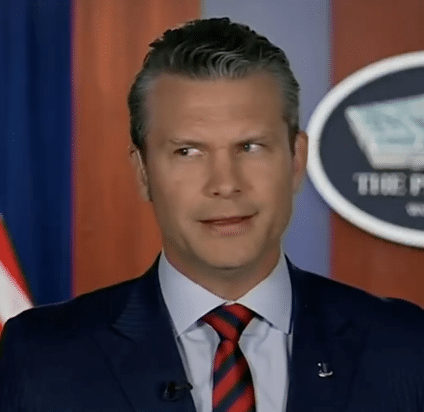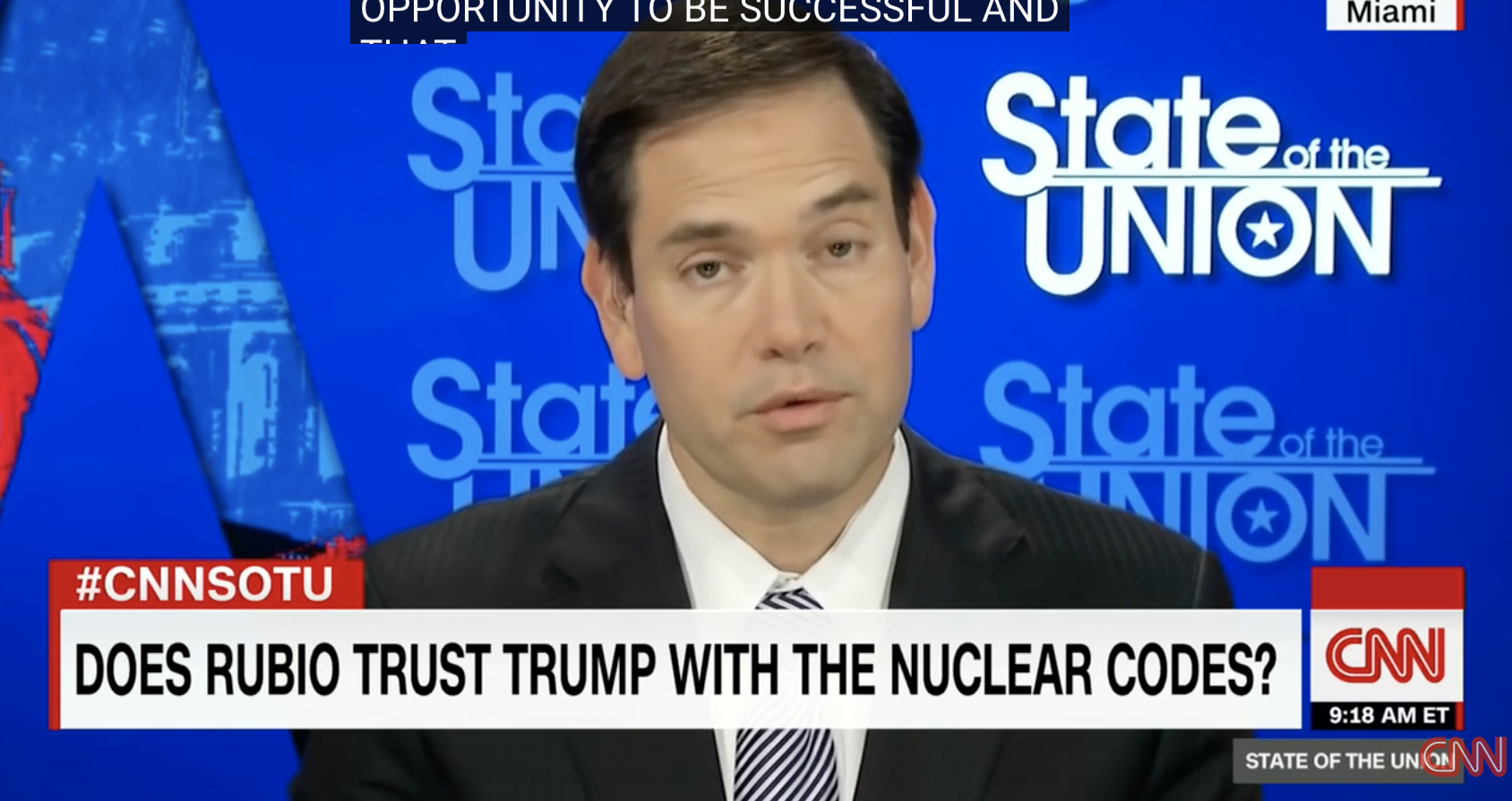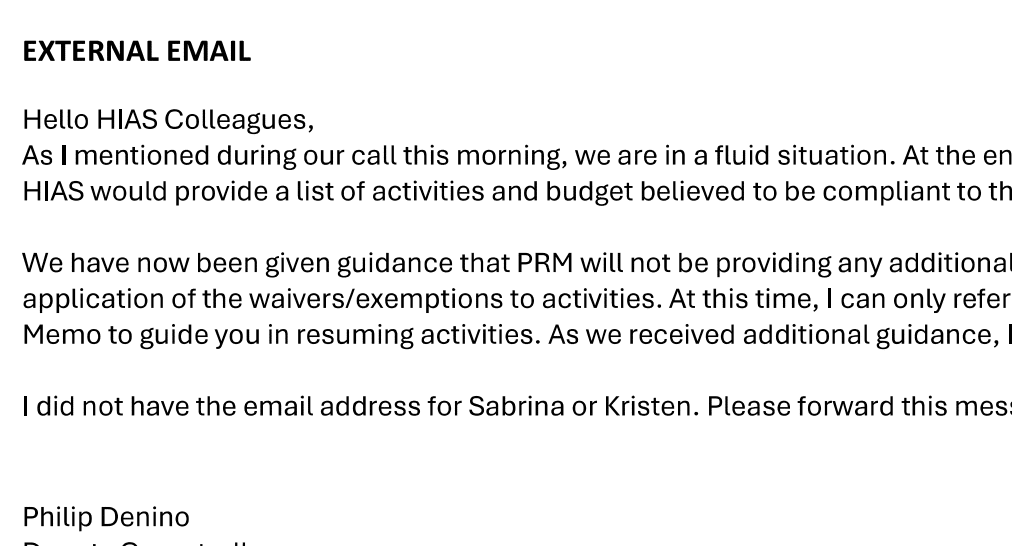Donald Trump, Nayib Bukele, and Kristi Noem love to make fascist spectacle.
They did it with the video showing the arrival of hundreds of people Trump sent to Bukele’s concentration camp. Noem did it with her visit to the camp. And they did it with the planned theater yesterday, including the staged hot mic moment where Trump told Bukele he wanted to send “homegrowns” to the concentration camp at CECOT.
They do it because fascist spectacle inspires fear. They do it because fascist spectacle goes viral, including with the help of data mules who purport to oppose its content.
They do it because it short circuits rational thought, overwhelming such rational thought with emotion.
The effect of yesterday’s fascist spectacle led virtually everyone to focus on a detail that won’t help the immediate fight before us — Trump’s interest in deporting “homegrowns,” an interest he has stated openly over and over, starting during campaign — rather than on details that might help Kilmar Abrego Garcia, and in the process help to prevent similar treatment of other migrants and, ultimately, American citizens.
Few people raised any of the questions posed by Trump’s latest attempt to retcon a legal case he already blew. Let’s start with the big one:
Why did Trump free someone, Abrego Garcia, whom Stephen Miller insists is a dangerous terrorist?
The latest theory about Abrego Garcia — one DOJ first rolled out at the Fourth Circuit — is that when the Trump Administration designated MS-13 a foreign terrorist organization earlier this year, it meant Abrego Garcia was no longer eligible for the withholding of removal granted to him in 2019.
It is true that an immigration judge concluded six years ago that Abrego Garcia should not be returned to El Salvador, given his claims about threats from a different gang. Final Removal Order 7–10. That conclusion was dubious then (and increasingly so now). But it has become totally untenable, given the Secretary of State’s designation of MS-13 as a Foreign Terrorist Organization in February. 90 Fed. Reg. at 10030–31.
As a result of that designation, and Abrego Garcia’s membership in that terrorist organization, he would no longer be eligible for withholding relief under the federal immigration laws. 8 U.S.C. §§ 1231(b)(3)(B)(iv); 1227(a)(4)(B). And as even Plaintiffs admit, the Government had available a procedural mechanism under governing regulations to reopen the immigration judge’s prior order, and terminate its withholding protection. See Reply 8. To be sure, the Government did not avail itself of that procedure in this case. But through the lens of the public interest, the district court’s stunning injunction does not fit that error. A mistake of process does not warrant the unprecedented remedy ordered—one that demands the return of a foreign terrorist from the foreign sovereign that agreed to take him.
Before this claim, DOJ barely mentioned two earlier rulings from 2019 (one two) asserting Abrego Garcia could not be released because of hearsay ties to MS-13, relying instead on procedural arguments. In a footnote, Judge Xinis ruled that DOJ did not rely on it before her.
Defendants did not assert—at any point prior to or during the April 4, 2025, hearing—that Abrego Garcia was an “enemy combatant,” an “alien enemy” under the Alien Enemies Act, 50 U.S.C. § 21, or removable based on MS13’s recent designation as a Foreign Terrorist Organization under 8 U.S.C. § 1189. Invoking such theories for the first time on appeal cannot cure the failure to present them before this Court. In any event, Defendants have offered no evidence linking Abrego Garcia to MS-13 or to any terrorist activity. And vague allegations of gang association alone do not supersede the express protections afforded under the INA, including 8 U.S.C. §§ 1231(b)(3)(A), 1229a, and 1229b.
As Judge Stephanie Thacker noted in the Fourth Circuit opinion denying a stay the government thereby could not raise it before her.
Finally, I turn to the Government’s assertion that the public interest favors a stay because Abrego Garicia is a “prominent” member of MS-13 and is therefore “no longer eligible for withholding relief.” Mot. for Stay at 14–15. Whatever the merits of the 2019 determination of the Immigration Judge (“IJ”) regarding Abrego Garcia’s connection to MS-13,8 the Government presented “[n]o evidence” to the district court to “connect[] Abrego Garcia to MS-13 or any other criminal organization.” Dis.t Ct. Op. at 22 n.19; see also id. at 2 n.2 (“Invoking such theories for the first time on appeal cannot cure the failure to present them before this Court.”). Indeed, such a fact cannot be gleaned from this record, which shows that Abrego Garcia has no criminal history, in this country or anywhere else, and that Abrego Garcia is a gainfully employed family man who lives a law abiding and productive life. Tellingly, the Government “abandon[ed]” its position that Abrego Garcia was “a danger to the community” at the hearing before the district court. Dist. Ct. Op. at 22 n.19. The balance of equities must tip in the movant’s favor based on the record before the issuing court. An unsupported — and then abandoned — assertion that Abrego Garcia was a member of a gang, does not tip the scales in favor of removal in violation of this Administration’s own9 withholding order. If the Government wanted to prove to the district court that Abrego Garcia was a “prominent” member of MS-13, it has had ample opportunity to do so but has not — nor has it even bothered to try.
The Government’s argument that there is a public interest in removing members of “violent transnational gangs” from this country is no doubt true, but it does nothing to help the Government’s cause here. As noted, the Government has made no effort to demonstrate that Abrego Garcia is, in fact, a member of any gang, nor did the Government avail itself of the “procedural mechanism under governing regulations to reopen the immigration judge’s prior order[] and terminate its withholding protection.” Mot. for Stay at 16–17. The Government may not rely on its own failure to circumvent its own ruling that Abrego Garcia could not be removed to El Salvador.
8 Even then, the Government’s “evidence” of any connection between Abrego Garcia and MS-13 was thin, to say the least. The Government’s claim was based on (1) Abrego Garcia “wearing a Chicago Bulls hat and hoodie,” and (2) “a vague, uncorroborated allegation from a confidential informant claiming he belonged to MS-13’s ‘Western’ clique in New York—a place he has never lived.” S.A. 146 n.5; Mot. for Stay Add. at 10–11.
9 Of note, the IJ’s 2019 decision, which granted Abrego Garcia withholding of removal to El Salvador pursuant to 8 U.S.C. § 1231(b)(3)(A) because he faced threats to his life from an El Salvadoran gang that had targeted him and his family, was during President Trump’s 2016–2020 term in office. That decision became final on November 9, 2019, and was not appealed by this Administration.
But let’s take this retcon on its face. Stephen Miller has now decided, with no evidence provided, that Abrego Garcia is a “prominent” leader of MS-13, a gang on which DOJ focused closely for the entirety of the first Trump Administration. Miller says that Abrego Garcia is a danger to the community. Miller keeps screeching about terrorism.
If what Miller is saying now is true, it means that Trump released a dangerous criminal back in 2019. Why did Trump leave this man on the street to do dangerous things like raising three American citizen children for six years?
Update: Roger Parloff has a good summary of the flimsy case that Abrego Garcia has ties to MS-13.
Why is Trump so weak that he can’t make requests of the dictator of a small country?
Next consider Pam Bondi’s claim that, notwithstanding public reports that the detainees are just being held in CECOT for a year, notwithstanding Kristi Noem’s visit to the concentration camp, notwithstanding that the government just sent another ten people down there, the government is helpless to get Abrego Garcia back.
What does this say about Trump’s weakness as a President?
What kind of weak ass man can’t even make a request of a small Central American nation?
How does Trump think he’ll negotiate with Xi Jinping if he can’t even make a simple request of Bukele?
Will Stephen Miller send adjudged terrorists like Stewart Rhodes and Joe Biggs to Bukele’s concentration camp? Will Miller send DC US Attorney Ed Martin there, for palling around with adjudged terrorist Kelly Meggs, the same kind of associational ties used to send at least one of the men on the flights on March 15 to CECOT?
Next, let’s take Trump at his word that he wants to send “homegrowns” to CECOT.
Should Stewart Rhodes and Joe Biggs — both adjudged to be terrorists, both radicalized in the United States — both be packing their bags for the concentration camp? If Ed Martin has been palling around with adjudged terrorist Kelly Meggs — the same kind of associational guilt used to send at least one of the Venezuelans in the March 15 flight — should he worry about packing his bags?
Will Stephen Miller send his terrorists to the concentration camp?
Is Miller using the designation of terrorism just as a way to criminalize brown people, or will he send terrorists from his own tribe to the concentration camp?
Why is Stephen Miller terrified of — why does he want you to be terrified of — loving fathers?
Miller has been accusing journalists who describe the contributions Abrego Garcia has made as a loving father to three American citizen children of lying, because journalists refuse to repeat his bleated accusations of terrorism with no evidence. Miller and Pam Bondi are working hard to get people to dumbly adopt their accusations.
But why is Miller so afraid of journalists describing Abrego Garcia as what he is, a father from Maryland?
Why does Pam Bondi keep destroying the careers of DOJ attorneys because they tell the truth?
When DOJ decided to retcon this case, they scapegoated the lawyer from whom they had withheld any sound legal basis, Erez Reuvani, along with his supervisor, both of whom were put on leave.
This, in spite of the fact that Drew Ensign called Reuveni “top notched” when he promoted him just weeks earlier.
In a March 21 email announcing Mr. Reuveni’s promotion to acting deputy director of the department’s Office of Immigration Litigation, his boss, Drew C. Ensign, lauded him for working on cases filed against sanctuary cities accused of defying federal immigration laws, and for generally helping to expand the department’s litigation activities.
“I want to thank those who submitted interest for the acting positions — we had outstanding choices, which helps go to show the excellent caliber of our team,” Mr. Ensign wrote.
Mr. Ensign has been handling a separate immigration case, one in which he has been defending the Trump administration’s use of a rarely invoked wartime law, the Alien Enemies Act, to summarily deport scores of Venezuelan migrants accused of belonging to the street gang Tren de Aragua.
As DOJ has provided increasingly contemptuous updates to Judge Xinis, the AUSA who had appeared before her, Tarra DeShields, has backed off vouching for the arguments DOJ has made, instead listing her involvement as “fil[ing]” updates.

Finally, Ensign filed a notice of appearance and, apparently, took on this dogshit argument himself, as he did the Alien Enemies Act before Judge Boasberg.
Obviously, even committed immigration lawyers are unwilling to make these arguments. How many career attorneys will Pam Bondi chase away while floating these arguments?? How many careers will she destroy because the actions of the Trump administration have no defense in the law?
Has Bondi’s DOJ lost all presumption of regularity?
And the whole process of admitting fault, suspending the person who (along with several others) told that truth, and then inventing new theories after the fact has to start destroying the entire concept of presumption of regularity for DOJ.
Even before DeShields started getting cold feet, even before Stephen Miller started disclaiming the error that everyone has admitted, Ben Wittes raised this question: At what point are judges entitled to demand proof from DOJ lawyers for their claims?
Will Xinis demand that DOJ document their new theory that Trump’s terrorist designations retroactively make judge’s orders disappear?
Would Marco Rubio deport his own grandfather to a concentration camp if Stephen Miller told him to?
Abrego Garcia’s story — of a man who came to the US to seek a better life without proper paperwork, but who was allowed to stay and build a life — is not all that different from the story of Marco Rubio’s own grandfather, who was almost denied entry in part because of suspicions he had communist sympathies and even then only allowed to stay as a parolee.
It had been almost three years since he had last set foot in the United States, and he no longer had the proper credentials to enter. They told him he could stay for the time being, but if he wanted to avoid deportation, he would have to plead his case.
“I always thought of being here in the United States as a resident, living permanently here,” the slight 62-year-old grandfather, speaking through an interpreter, said at a hearing five weeks later. He said that he had previously returned to Cuba because he did not want to be a burden on his family in the United States, but that the Cuban government had grown too oppressive and he feared what might happen if he stayed.
The immigration officer was unmoved. He did not see an exiled family man — just someone who had no visa, worked for the Castro government and could pose a security risk.
“It is ordered that the applicant be excluded and deported from the United States,” he said matter-of-factly, according to an audio recording of the proceedings stored by the National Archives. He stopped to ask if Mr. Garcia understood.
“Yes, I do,” Mr. Garcia said plaintively.
That easily could have been the end of his American story. But someone in the immigration office on Biscayne Boulevard that day — the paperwork does not make clear exactly who or why — had a change of heart. Mr. Garcia was granted status as a parolee, a gray area of the law that meant he would not get a green card but could remain in the United States.
[snip]
Despite Mr. Garcia’s insistence that he was fleeing oppression, immigration officials raised suspicions that he might harbor communist sympathies, the records reveal. That charge, had they pursued it, could have led to a conclusion that he was a national security threat. (Details of Mr. Garcia’s immigration odyssey were reported in 2012 by Manuel Roig-Franzia in his book “The Rise of Marco Rubio.”)
In an interview, Mr. Rubio acknowledged that some would see a conflict between the stricter immigration and refugee policies he supports and his grandfather’s experience. Immigration records also show that other members of Mr. Rubio’s family — two aunts and an uncle — were admitted as refugees.
But Mr. Rubio said the difference between then and now is how much more sophisticated foreign infiltrators like the Islamic State have become, and how dangerous they are.
“I recognize that’s a valid point,” the senator said, “But what you didn’t have was a widespread effort on behalf of Fidel Castro to infiltrate into the United States killers who were going to detonate weapons and kill people.”
Last month, Trump announced the cessation of various parole programs, including a recent one including Cubans, effective on April 24. Which means, within days, Cubans could be among the Hispanic migrants that Stephen Miller packages up to send to Bukele’s concentration camp.
How many Cubans will Marco Rubio send away to a concentration camp? How many lives like Rubio’s own will the Secretary of State doom with his enthusiasm to send send loving fathers to concentration camps?
For too long Trump’s lefty opponents (liberals and progressives and those further left; anti-Trump Republicans are, in my opinion, actually far better at this) have largely failed to make Trump’s fascism a political problem. And while lawyers have done a great job of humanizing their clients — including Abrego Garcia — in public opinion, the rest of it, the contradictions and confessions of pathetic weakness, has largely gone unmentioned.
Do not abdicate making Abrego Garcia a political, as well as a legal, case. Do not get distracted by the fascist spectacle from using the fragile story rolled out yesterday against Trump. The stakes in this moment are too high.













